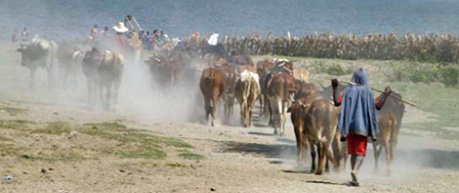Monday 25th May 2020, 4:00pm
Livestockdata.org aims to communicate the best available data and evidence on livestock health and productivity.

Livestockdata.org is managed by Supporting Evidence Based Interventions (SEBI) on behalf of the Livestock Data for Decisions (LD4D) community of practice.
According to SEBI, poor quality, scarce and disparate data are holding back development of the livestock sector in low and middle-income countries. This impacts the lives of millions of people who depend on livestock for a living.
The new site aims to build up a knowledge base of open access data, interactive tools and visualisations that policy makers and investors can use to make evidence-based decisions.
"Project funders and implementers have basic yet critical questions such as what projects are working where, how many livestock are there in the world and where, and which animal diseases are most prevalent in countries. Good evidence is needed to shape the investments that improve the lives of smallholder livestock keepers."
Among the first products released is a map of livestock development projects in low-and middle-income countries. The interactive map of nearly 400 projects shows who is working where, and on what, and also indicates what data the projects are generating.
The map, which currently displays projects funded by the Bill and Melinda Gates Foundation, USAID and UK Aid, aims to support better coordination among livestock interventions. SEBI hope to expand the map to include other funders and link to materials such as project outputs and reports to give fuller insights into project activities.
"We are taking a demand-driven approach to developing products, pulling together hard-to-reach evidence and presenting in a way that responds to user needs. Our ambition is to unlock the value in existing data, and use visuals to help users navigate and draw insights from that data."
Another feature is an interactive visualisation of data on the distribution of livestock around the world, building on data from the United Nations Food and Agriculture Organisation (UN FAO). This data can help project funders and researchers identify and tailor interventions to needs of local animal populations.
"We need up-to-date and easy-to-digest evidence to help answer pressing questions. Livestockdata.org promises to respond to decision maker needs and help close the data gaps that currently hinder progress."
The website represents several years of collaborative effort. Expert advisors from leading livestock research institutes are helping to ensure evidence is of the best possible quality and fit for purpose. Community feedback has helped ensure data is accurately presented and visualisations are well-designed.
Initial contributors to the site include the UN Food and Agriculture Organisation (FAO), the International Livestock Research Institute (ILRI), and Australia’s Commonwealth Scientific and Industrial Research Organisation (CSIRO).
"Innovative solutions require cross-disciplinary collaborations, and as a community we can achieve more than as individual organisations. This website is developed with the community’s inputs, and also serves as a resource for its members."
The site also benefits from the input and expertise of partners who do not typically work on livestock. SEBI is collaborating with the University of Edinburgh’s Bayes Centre to accelerate data analytics and applying natural language processing and machine learning to rapidly generate novel datasets for the site.
"We have received positive feedback about the products from a number of donor agencies. The next challenge is to include more countries and data sources, and keep the information up to date. Our collaboration with the Bayes centre will help us automate and accelerate this process using applied data analytics techniques."
Louise Donnison, Senior Data Analyst for SEBISource: The University of Edinburgh